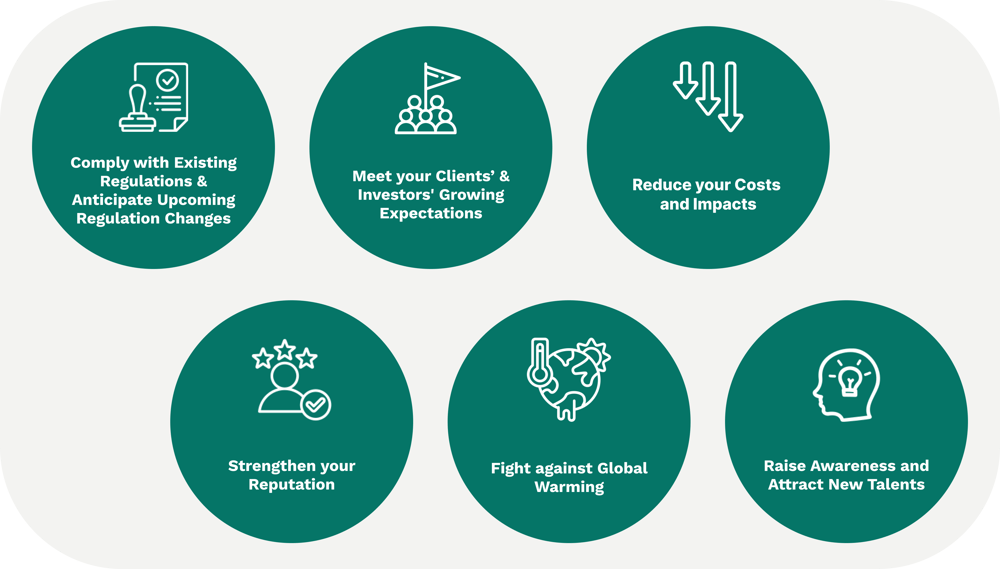6 Reasons to Measure your Corporate Carbon Footprint
Table of contents
Why is it important to measure your carbon footprint?
1. Comply with Existing Regulations & Anticipate Upcoming Regulation Changes
2. Meet your Clients’ & Investors' Growing Expectations
3. Reduce your Costs and Impacts
4. Strengthen your Reputation
5. Fight against Global Warming
6. Raise Awareness and Attract New Talents
How ClimateSeed can help your company to start its decarbonization jouney?
Why is it important to measure your carbon footprint?
There are many reasons that have become evident in an increasingly severe and urgent climate context. Not only are these affecting individual consciousness, but also impact decision-making processes in the business world.
Within a business environment, customers and investors are becoming increasingly sensitive to environmental issues. Measuring your carbon footprint is a strategic tool for structuring a solid environmental strategy. A large majority of companies are calculating their carbon footprint and here are 6 reasons for you to do the same:

1. Comply with Existing Regulations & Anticipate Upcoming Regulation Changes
Companies with more than 500 employees are obliged to carry out a GHG assessment (by EU directive 2014/95/EU, French ”Grenelle II law”, German “CSR Act”). However, since the business sector is largely responsible for each country’s emissions, climate regulations are very likely to change and affect a broader scope of companies.
From 2024 onwards, the European Sustainability Reporting Directive (EU CSRD) will extend this requirement to companies with more than 250 employees (SMEs and all companies listed on regulated markets). This directive concerns more than 50,000 companies.
2. Meet your Clients’ & Investors' Growing Expectations
It is increasingly common for investors nowadays to request companies to disclose their carbon footprint and reduction strategies. It has become a key decision factor for their investment or partnerships. Customers also attach greater importance to a company's environmental commitment, and it is a criterion that increasingly influences their purchasing decision.
These growing concerns are likely to become a new norm for stakeholders. More investors are paying attention to the extra-financial parameters of a company related to ESG (environmental, social, governance).
In the Environmental part (E), the measurement of the carbon footprint plays a fundamental role in creating an environmental strategy that can align with investors' requirements. In addition, the SFDR regulation requires companies in the financial sector to communicate extra-financial information for each of their products and to classify them.
3. Reduce your Costs and Impacts
Measuring your carbon footprint allows you to determine carbon reduction opportunities, usually linked to energy and transportation. Excessive energy use or other inefficiencies are frequently associated with high levels of greenhouse gas emissions. Lowering your GHG emissions means increasing your efficiency and cost-effectiveness. Implementing low-carbon solutions not only leads to reductions in emissions, but also overall costs.
4. Strengthen your Reputation
Transparently disclosing your carbon emissions and reduction goals is a competitive advantage. It shows your involvement and commitment to preserving the environment.
Although this is still considered a competitive advantage today, this trend will tend to weaken, as environmental commitment increasingly becomes the new norm.
5. Fight against Global Warming
Fighting climate change should be the first motivation for measuring your corporate carbon footprint. We all have a role to play in the fight against global warming, but companies have the biggest room for action.
By measuring their carbon footprint, companies can identify their highest emission sources, which allows them to implement an emission reduction strategy and thus reduce their environmental impact.
6. Raise Awareness and Attract New Talents
Awareness leads to action. By measuring your carbon footprint, you inspire others to do the same. It highlights the fact that reduction measures exist and can be implemented. In addition, being a company that has a robust sustainability strategy is also a way to attract and retain talent. Individuals are more sensitive to the sense of their work and are increasingly interested in making a difference. Today, successful professionals favor a company that shares the same environmental values.
How ClimateSeed can help your company to start its decarbonization jouney?
In line with all these reasons, it is necessary for companies to adopt a solid environmental approach. This starts with measuring company's carbon footprint. ClimateSeed is able to support your journey on optimizing your carbon footprint. We provide a digital platform and experts to measure and reduce your carbon footprint in line with GHG Accounting Standards and Science-based Targets (SBTi). This is done through simplified data collection, including; creation of data collection strategy, collaboration accesses to collect data from key stakeholders, bulk data import, and intuitive data collection forms tailored to your industry. Along with, reported results compliant with GHG accounting standards. This entails emissions factors adapted to your organisation and products, several premium emission factor databases, results transparency and granularity, and optional data validation by our consultants.
The main sectors we cover are; pharma, hospitality, luxury, transportation, events, banking, cosmetics, textiles, and services.
Measuring your carbon footprint is the first step toward a successful environmental journey. Ready to get started? Contact us.
Q&A
The carbon footprint represents the total quantity of greenhouse gases (GHGs), notably carbon dioxide (CO₂), emitted directly and indirectly by a person, organization, event or product. These emissions are measured in carbon dioxide equivalents (CO₂e) to take account of the different gases and their relative impact on global warming. Measuring a company's greenhouse gas emissions, is essential for regulatory compliance and risk management. It helps reduce costs through greater energy efficiency, and strengthens brand image by meeting the environmental expectations of consumers and investors. What's more, effective carbon footprint management can open up new market opportunities and foster innovation.
The CSRD, or Corporate Sustainability Reporting Directive, is a European directive designed to improve transparency in corporate sustainability reporting. It extends the requirements of the previous Non-Financial Reporting Directive (NFRD) to a wider range of companies.
The CSRD will be phased in gradually. Application will be deferred according to the categories of companies concerned. We invite you to read our article on the CSRD for more details.
To get started on your organization's carbon footprint, follow these key steps:
Define the scope: Identify the activities, sites and sources of emissions to be included in the carbon footprint.
Collect data: Gather data on energy consumption, vehicle emissions, raw material consumption, etc.
Calculate emissions: Use specific emissions factors to convert consumption data into CO₂ emissions.
Analyze results: Evaluate major emissions items and identify reduction opportunities.
Plan actions: Develop an emissions reduction strategy based on the analysis.
Implement and monitor: Implement reduction measures and monitor their effectiveness over time.
It is advisable to call on the expertise of a specialist service provider such as ClimateSeed to measure your carbon footprint accurately and to benefit from advice tailored to your sector and your specific requirements. Please contact us for further details.
Share this
You May Also Like
These Related Stories

What you need to know about corporate carbon footprint

What can my Company do to Reduce its Carbon Emissions?

.webp?width=318&height=439&name=Download%20Guide%20measure%26reduction%20EN%20(1).webp)